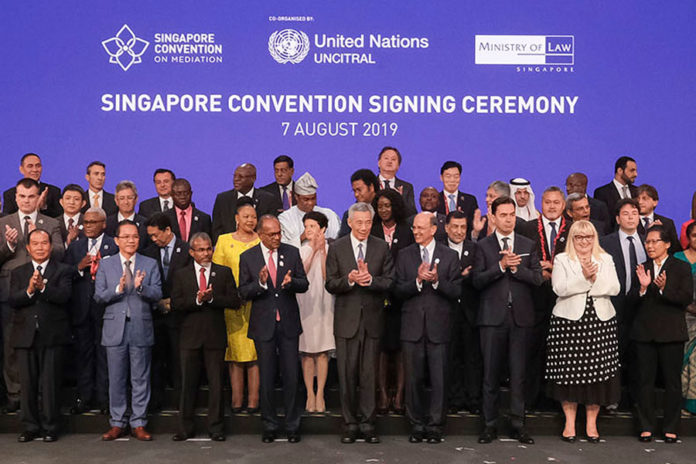Arbitration experts welcomed the signing of the Singapore Convention on 7 August 2019, with one noting the absence of European countries and pointing to a changing of the guard at the top tier of arbitration locations.
HFW partner in Singapore, Paul Aston, said the absence of any European nations among the initial signatories was somewhat surprising.

“It has been reported that the reason for this is a lack of clarity as to whether the EU may ratify the Singapore Convention as a bloc, or whether each member state should do so individually,” Aston said. “The UK is historically a very pro-mediation jurisdiction, however, and its courts would uphold and enforce any settlement agreement reached between parties in a mediation with or without the convention, such that the UK’s non-ratification is unlikely in reality to make any difference.
“The UK’s non-ratification, and the enthusiasm of countries in Asia-Pacific (who account for 28 of the 54 initial signatories), however, is significant insofar as it reveals an increasing shift away from London’s dominance as the world’s preferred centre for international commercial dispute resolution.”
Delegations from 46 countries signed the UN Convention on International Settlement Agreements resulting from Mediation, also known as the Singapore Convention, on 7 August 2019.
Among them, the world’s two largest economies, the US and China, as well as Asian economic powerhouses such as India, South Korea and Singapore, signed the new international treaty that will enable the enforcement of mediated settlement agreements among the signatory countries.
The new convention provides settlements for cross-border disputes through a unified framework for enforcement, rather than take them to court. Commercial parties originating from states that ratify the convention should now more readily consider mediation as a means to resolve disputes.
Mohammed Reza, partner of Simmons and Simmons in Singapore, told Asia Business Law Journal that until the adoption of the convention, one historical barrier to settling international disputes through mediation was the lack of a framework for the cross-border enforcement of mediated settlement agreements.

“The convention allows parties from signatory states to enforce mediated settlement agreements directly in the courts of any signatory state,” said Reza.
However, he said that within the global enforcement framework under the convention, there are grounds on which the courts of a signatory jurisdiction may refuse to enforce a mediated settlement agreement. “The party seeking to resist enforcement of the mediated settlement agreement may seek to interpret the grounds for refusing to grant relief (article 5 of the convention) broadly, as certain terms are not defined, such as ‘serious breach’ in respect of standards applicable to the mediator or the mediation,” said Reza.
He said the party seeking enforcement may face arguments over what standards should apply when considering the grounds for refusal under the convention, which will likely protract the enforcement proceedings.
Despite the increased enforceability of mediated settlement agreements, parties seeking to enforce them are likely to face some challenges and difficulties in the enforcement stage, as objecting parties may rely on several grounds of refusal under the convention, and raise additional arguments in an attempt to stave off enforcement.
Some 700 government leaders, business executives, legal practitioners and academics from 70 countries attended the signing ceremony.
Reza said that with the rise of massive cross-border projects like the Belt and Road Initiative (BRI), mediation, and the new convention could prove effective for parties involved to resolve disputes more quickly and efficiently, and with less conflict.
“With the efficient resolution of disputes, there is a greater chance that commercial disputes will not affect bilateral relations or delay the progress of BRI projects,” said Reza.
Aston said: “There is a battle out there by the court systems to challenge arbitration and domestic court. Some domestic court systems such as Singapore and England are superb and the English Commercial Court (a division of the English High Court) and the International Commercial Court of Singapore (a division of the Singapore High Court) only serve to enhance their reputations for judicial and fair impartial excellence.
“Their emergence is due to the need to make commercial dispute resolution faster and more streamlined, as well as cheaper. That is where they could have the edge over traditional international arbitration, which especially in the large construction arbitration area can be said to have ‘overcooked the golden goose’.
Alongside the signing ceremony, Singapore and the UN also inked a memorandum of understanding to co-operate in the organization of an UNCITRAL Academy in Singapore.
Another event to mark the convention included the grand opening of Maxwell Chambers Suites, an extension of Maxwell Chambers, which took place on 8 August during Singapore Convention Week. Established in 2010, Maxwell Chambers was the world’s first integrated centre dedicated to alternative dispute resolution.































